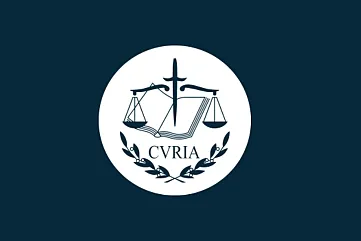Tuesday 19th March (9 am)
Judgments in Case C-163/17 Jawo and Joined cases C-297/17 Ibrahim, C-318/17 Ibrahim, C-319/17 Sharqawi & others & C-438/17 Magamadov
Social benefits to asylum seekers
There will be a press release for these judgments
In the Jawo case, a German court would like to know if an asylum seeker can be sent back to the Member State responsible for examining his application under the Dublin III Regulation in cases where this person, despite being granted asylum in that State, would foreseeably be subject to inhuman or degrading treatment as a result of having to live there in poverty, without a permanent domicile and at the edge of society. These words were employed by a Swiss refugee aid organisation in 2016 to describe the Italian asylum system.
In the other cases, the German Federal Administrative Court has asked the Court whether Germany, in accordance with the Dublin III Regulation, is entitled to refuse the grant of international protection to persons who are already beneficiaries of such a protection in another Member State (in Bulgaria and Poland in the cases at hand), despite the fact that these persons do not receive living allowances in that State or the amount of such allowances is much less than that provided by other Member States, with however the persons in question not being treated differently than the citizens of the State at issue when it comes to granting access to social benefits in the form of living allowances.
Monday 25th March (2.30 pm)
Hearing in Case C-418/18 P Puppinck & others v Commission
European citizens’ initiative for the protection of human embryos
According to the Treaty on European Union, EU citizens, not fewer than one million from at least a quarter of all Member States, may take the initiative of inviting the Commission, within the framework of its powers, to propose to the EU legislature to adopt a legal act for the purpose of implementing the Treaties (‘European citizens’ initiative’). Before being able to begin collecting the requisite number of signatures, the organisers of the initiative must have it registered with the Commission, which examines in particular its subject matter and objectives.
In 2012 the Commission registered the proposed European citizens’ initiative entitled ‘One of Us’. The objective of that initiative is to establish a ban and end the financing, by the EU, of activities which presuppose the destruction of human embryos (in particular in the areas of research, development aid and public health), including the direct or indirect funding of abortion. After its registration, the initiative collected the requisite million signatures before being officially submitted to the Commission at the beginning of 2014. On 28 May 2014 the Commission stated in a communication that it did not intend to take any action.
Dissatisfied with the communication of the Commission, the authors of the initiative sought its annulment before the General Court, which, however, by a judgment of 23 April 2018, dismissed their action.
The authors of the initiative have brought an appeal before the Court of Justice against the General Court’s judgment.
Wednesday 27th March
Judgment in Case C-681/17 slewo
The consumer’s right to withdraw from an online contract
There will be a press release for this judgment
Mr Sascha Ledowski bought on the website of slewo, a German online sales company, a mattress that he unsealed following its delivery. The man then returned the mattress to the seller and requested the latter to reimburse him the sale price of
1 094.52 € of the product returned, plus the return costs. Mr Ledowski founded his request for reimbursement on the EU Consumer Rights Directive (2011/83/EU), under which the consumer has, following receipt of the product ordered, a period of 14 days to withdraw, without any reason, from an online contract.
The German company is however of the opinion that the right of withdrawal resulting from the Directive cannot be applied in the case at hand as it considers that the online sale of a mattress is subject to a specific rule of the Directive, under which sealed goods which are not suitable for return due to health protection or hygiene reasons cannot be returned.
The German Federal Court hearing the matter has asked the Court of Justice whether the Directive’s aforementioned specific provision is also applicable to the online sale of mattresses.
Thursday 28th March
Judgment in Case C-275/18 Vinš
Right to a tax exemption from VAT in respect of exportation of goods
There will be a summary for this judgment
From 2012 to 2014, a Czech private person supplied goods by post to non-EU countries without however placing them under a customs procedure as required by the Czech VAT legislation. Although it is not disputed that the goods in question actually exited the EU, the Czech tax authority refused to consider the transactions at issue as exportation of goods exempt from VAT under the EU VAT Directive (2006/112/EC), on which the Czech VAT legislation is based, on the ground that the goods concerned had not been placed under a customs procedure.
In this regard, it must be noted that the condition of having to be placed under a customs procedure seems to have been adopted by the Czech legislator by virtue of a provision of the Directive which allows the Member States to lay down specific conditions not included in the Directive for exemption from VAT in particular for the purposes of preventing tax evasion, avoidance or abuse.
The Nejvyšší správní soud hearing the dispute between the exporter of the goods and the tax authority has asked the Court of Justice if the Czech legislation contested, which renders the right to a tax exemption from VAT on the exportation of goods conditional on the fact that the goods must first be placed under a particular customs procedure, is compatible with the Directive.
Thursday 28th March
Opinion in Case C-482/17 Czech Republic v Parliament & Council
Validity of the Directive on control of the acquisition and possession of weapons
There will be a summary for the Opinion
In May 2017, the European Parliament and the Council (by way of adopting the Directive 217/853/EU) modified the Directive on control of the acquisition and possession of weapons (91/477/EEC), which lead to the prohibition of certain semi-automatic weapons and the matching magazines as well as to the introduction of more stringent rules in respect of deactivated and alarm weapons.
The Czech Republic is contesting before the Court of Justice the validity of the modifying directive, which, according to this Member State, should not have been adopted as a measure aiming at eliminating obstacles to the internal market since the new rules introduced do not pursue this objective but solely aim to prevent crime and terrorism. In addition, the Czech Republic alleges that the EU legislator breached the principle of proportionality, in particular, insomuch as it prohibited semi-automatic weapons which had never been used in the EU for committing terrorist acts.
Zdroj: CURIA



















